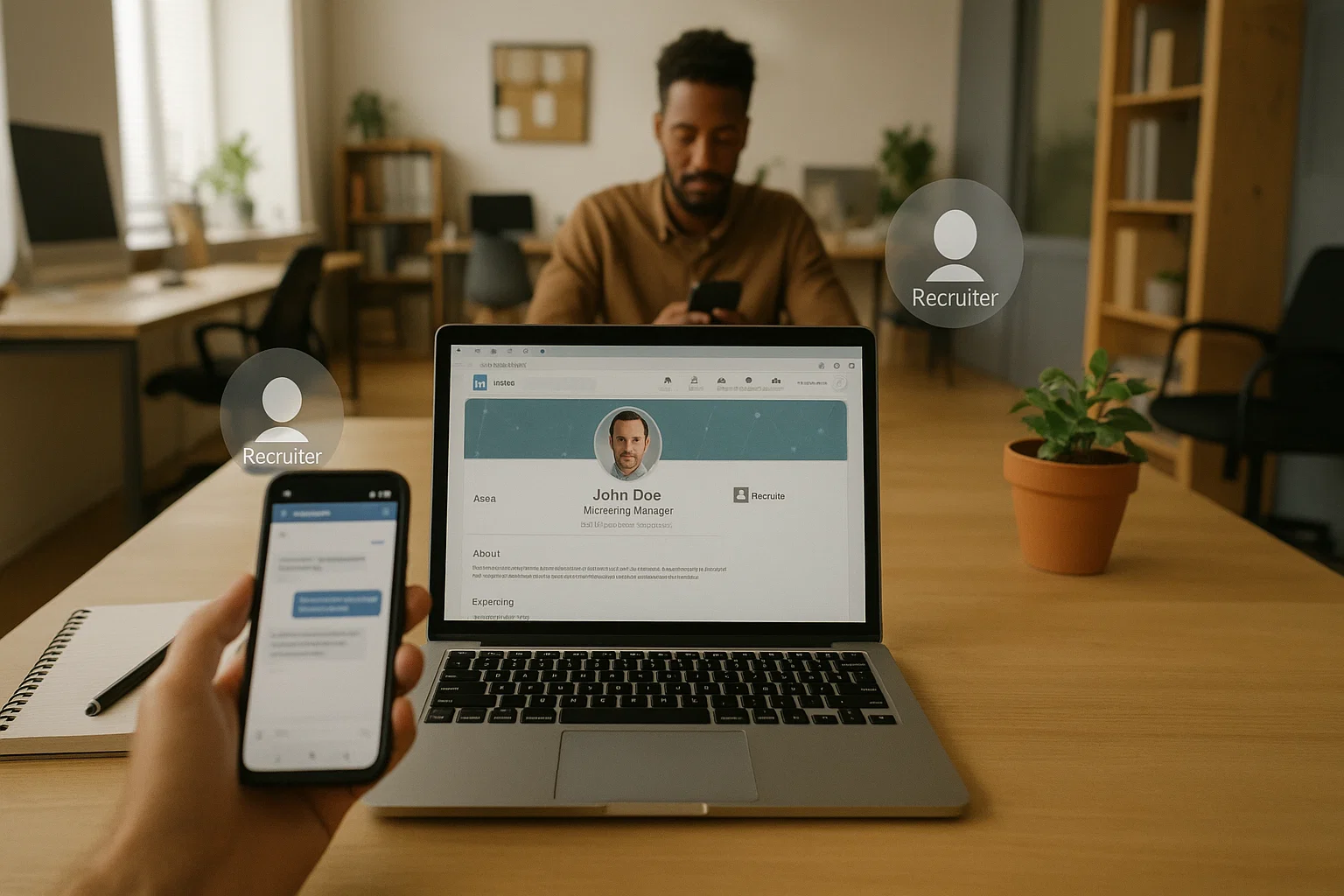What Recruiters Look For in Your Profiles
Understanding what employers check and how to make your profile work for you

What Recruiters Look For in Your Profiles
When a recruiter opens your profile on social networks, they have a specific goal. This isn't idle curiosity—it's a professional assessment that can determine your career future. Understanding exactly what employers are looking for will help you create a profile that works for you, not against you.
Verifying Information from Your Resume
Today, recruiters check your social networks as carefully as your resume itself. Research shows: 58% of employers review candidate profiles to find confirmation of their qualifications [Survey: 70% of employers check job candidates on social media (2023)]. This means LinkedIn has stopped being an "additional platform"—it's become a verification source.
Your online profile should strengthen your resume, not just repeat it formally. Companies use social networks to make sure you're really the specialist you position yourself as.
What exactly do recruiters look at:
- Experience consistency.Do company names, work dates, and positions match? Any gap or discrepancy raises questions—up to stopping the hiring process.
- Recommendations and reviews.Do colleagues confirm your skills? Are there comments about the quality of your work? This is one of the most reliable social proofs.
- Skills and real activity.Publications, projects, participation in discussions, certificates. If a candidate's resume says "Python, AWS" but their profile shows no trace of activity, it reduces trust.
- Education and achievements.Recruiters compare real achievements with what's stated in the resume: courses, projects, diplomas, participation in professional initiatives.
It's important to understand: 57% of employers found information on social networks that became a reason to reject a candidate [Survey: 70% of employers check job candidates on social media (2023)]. This isn't necessarily provocative content—most often it's factual inconsistencies.
So your task is to make your online profile work for you:
- synchronize resume and profile data;
- show real proof of skills;
- maintain a professional image;
- remove everything that could raise trust concerns.
Your LinkedIn isn't a mirror reflection of your resume. It's your public verifiable history. And that's what recruiters read first.
Cultural Fit with the Company
About 50% of employers check whether a candidate has a professional online presence [Survey: 70% of employers check job candidates on social media (2023)]—not just a profile, but how well the person matches the company's culture and values.
This means it's not about formality or whether "you have LinkedIn." Recruiters are trying to understand who you are as a person, how well you'll fit into the team, and whether you can work in their environment.
What exactly do they assess:
- Values and interests.Do your views and what you broadcast on social networks align with what's important to the company? Do you participate in initiatives, professional communities, or projects close to the employer?
- Communication style.How do you communicate online: calmly, professionally, respectfully—or, conversely, aggressively, sharply, toxically? For many companies, this is a deciding factor.
- Hobbies and activity.Your interests outside work help create a complete picture: sports, volunteering, communities—all of this affects how your professional image is perceived.
Interestingly, this is a two-way process. Research shows that 75% of candidates research company values on social networks before applying [Social Media Recruitment Statistics (2025)]. And employers do the same: they check how well the candidate fits them.
Modern hiring is less and less like a one-way skills assessment. It's more of a search for alignment in values, communication style, and culture—that match without which good work is impossible.
Professional Activity and Expertise
Research shows that 34% of employers check what other people write about a candidate [Survey: 70% of employers check job candidates on social media (2023)]—but even more important: what you write yourself. Professional activity on social networks isn't just a nicely formatted profile—it's a real signal of your expertise and engagement.
Recruiters especially value:
- Regular postswhen you share knowledge and opinions on your topic, it shows you don't just "work"—you live the profession.
- Participation in discussionscomments in professional groups, exchanging experience with colleagues, visibility of your position.
- Publications and articlesif you write about your field—that's a serious plus. A blog, LinkedIn article, presentation... all of this reflects your expertise.
- Participation in eventswebinars, conferences, meetups, mentions of them on social networks—these are signs of an active professional person, not just an "employee."
A personal profile that shows an active professional position attracts recruiters' attention much more often than a "lurker" profile with minimal information and no content. As research notes, companies increasingly look at a candidate's online activity as an indicator of "readiness" for the role.
If you think career-wise—treat social networks not as an "extra obligation," but as a tool for building a professional image.
Red Flags: What Scares Employers Away
Half of your hiring success isn't just what you show, but what you avoid. Research shows that 54% of employers have already rejected candidates solely because of what they found on their social networks [54 Percent of Employers Have Eliminated a Candidate Based on Social Media (2020)].
In the era of digital transparency, social networks have become not just a communication channel, but a window into your real life. And some signals instantly turn a potential candidate into "not a fit."
Top 5 red flags for recruiters:
- Inappropriate content.Posts related to alcohol, drugs, aggression, or toxic statements. 61% of employers consider such content a direct reason for rejection [More Than Half of Employers Have Found Content on Social Media That Caused Them Not to Hire a Candidate].
- Criticism of former employers.Negative posts about a past company, colleagues, or managers. 56% of recruiters perceive this as a risk to corporate culture.
- Information inconsistency.One thing in the resume, another on social networks. 49% of companies reject when they see discrepancies in experience, dates, or roles [60% of Employers Are Peeking Into Candidates' Social Media Profiles (2025)].
- Unprofessional photos.Inappropriate images in the profile, photos that don't match a business image. This is critical for 47% of employers [60% of Employers Are Peeking Into Candidates' Social Media Profiles (2025)].
- No profile.Paradoxically, 47% of employers also don't invite people they can't find online to interviews [60% of Employers Are Peeking Into Candidates' Social Media Profiles (2025)]. The absence of a digital footprint is already a red flag: "What is the candidate hiding?"
Social networks are part of your professional identity. And, as practice shows, the right digital image can speed up hiring, while the wrong one can close doors, even if you have excellent experience.
Book Your Free Intro Call
Talk to one of our mentors and discover how they can help accelerate your career. No commitment, just a conversation about your goals.
Meet Our Mentors
Experienced professionals from leading companies who will help you build a strong professional brand on social media and find your dream job.

Mikhail Dorokhovich
Founder
Full-Stack Development, System Architecture, AI Integration
Founder of mentors.coach. Full-stack engineer with 9+ years of experience building scalable platforms, mentoring teams, and shaping modern engineering culture. Passionate about mentorship, craftsmanship, and helping developers grow through real projects.
Specialties:

Gaberial Sofie
Co-Founder & HR Partner
Talent Development, Team Culture, HR Strategy
Co-founder and people-focused HR professional with a background in organizational psychology. Dedicated to building compassionate, high-performing teams where mentorship and growth come first.
Specialties:

George Igolkin
Blockchain Developer
Smart Contracts, DeFi, Web3 Infrastructure
Blockchain engineer passionate about decentralized systems and secure financial protocols. Works on bridging traditional backend systems with modern blockchain architectures.
Specialties:

Valeriia Rotkina
HR & Career Coach
Human Resources, Learning Programs, Career Education
HR specialist and educator with a focus on personal development and emotional intelligence. Helps professionals find clarity in their career path through structured reflection and goal-setting.
Specialties:

Kristina Akimova
HR Strategist
Recruitment, Employer Branding, Team Well-Being
HR partner dedicated to fostering healthy team dynamics and building inclusive hiring processes. Experienced in talent acquisition and communication strategy for growing tech companies.
Specialties:
Ready to Turn Social Media Into a Career Growth Tool?
One conversation with a mentor can change your perspective on job searching. Let's make that conversation meaningful.
Your story is already enough. The right strategy just helps it be heard.